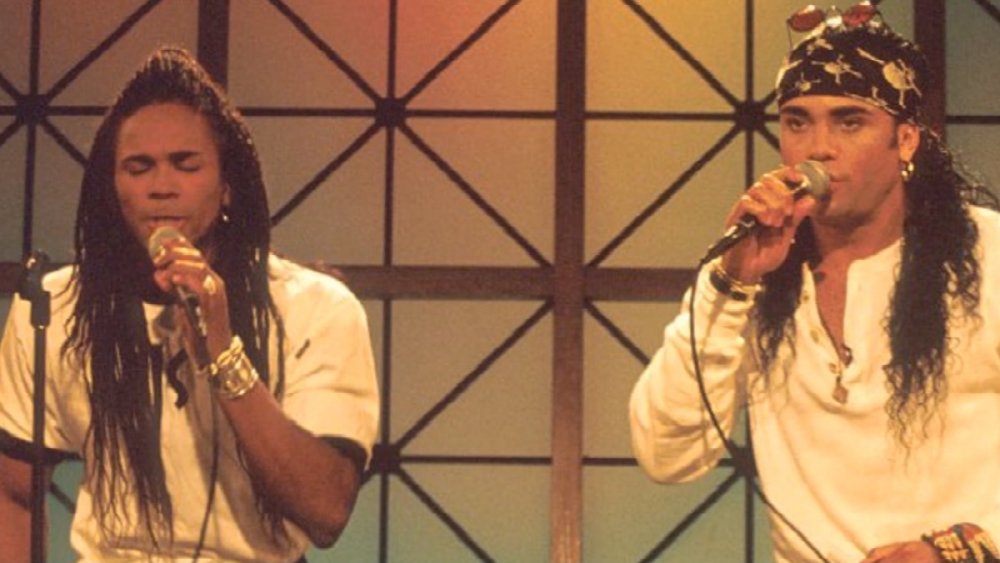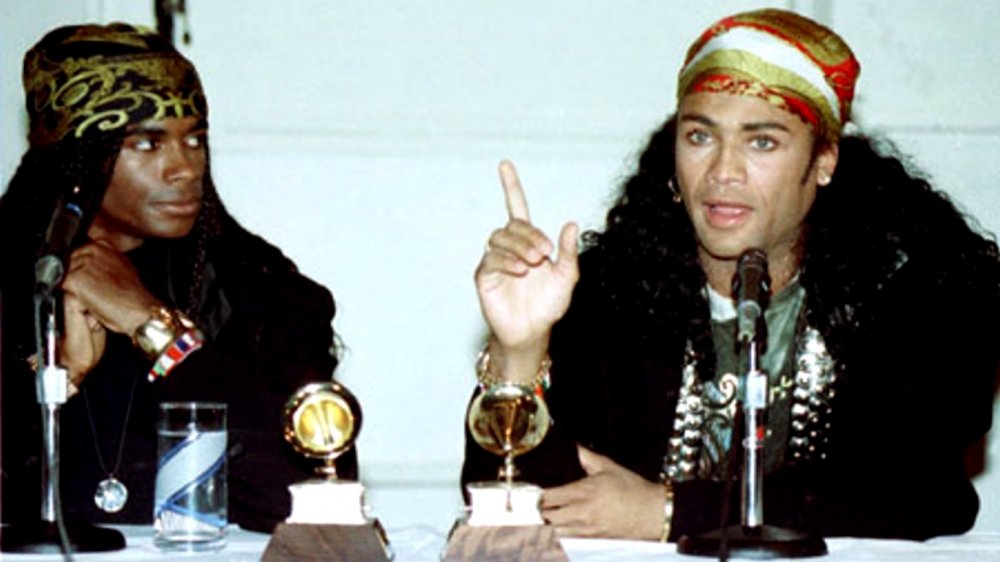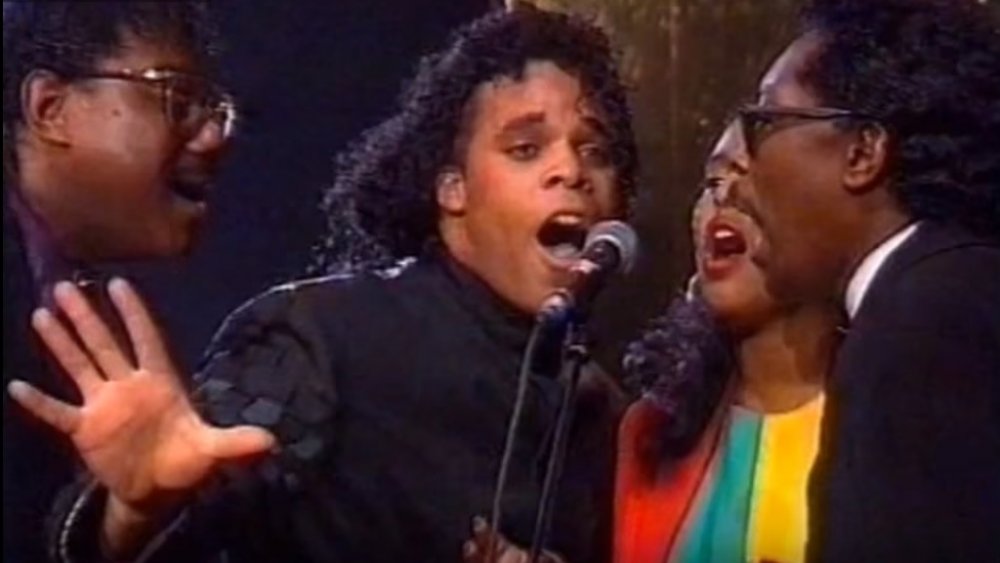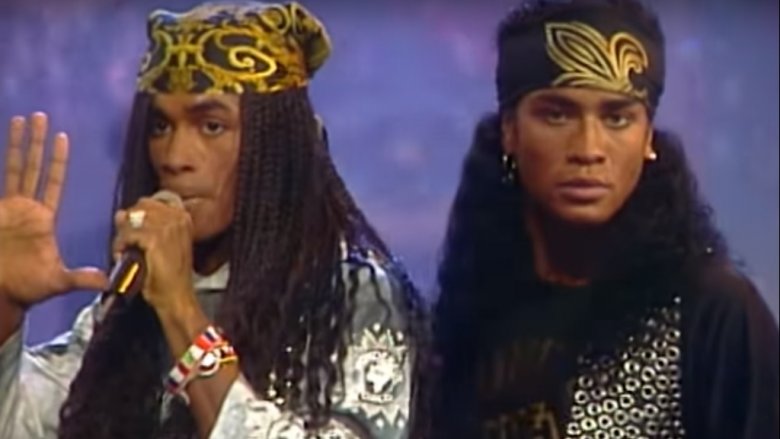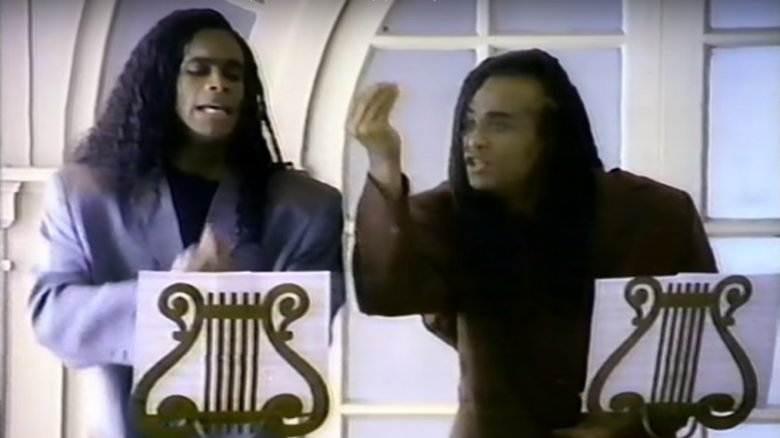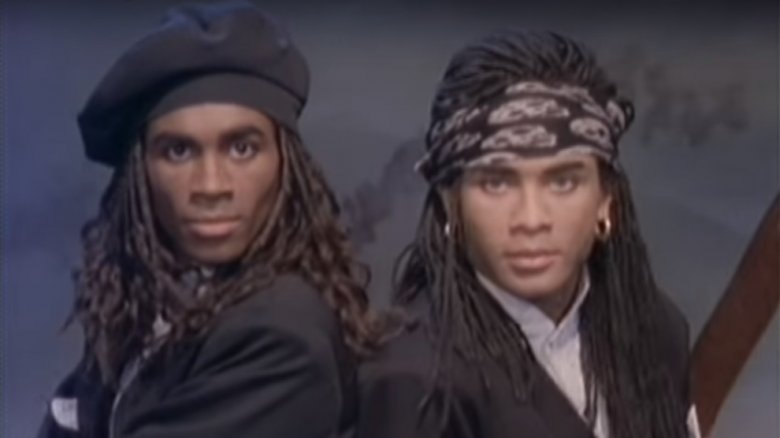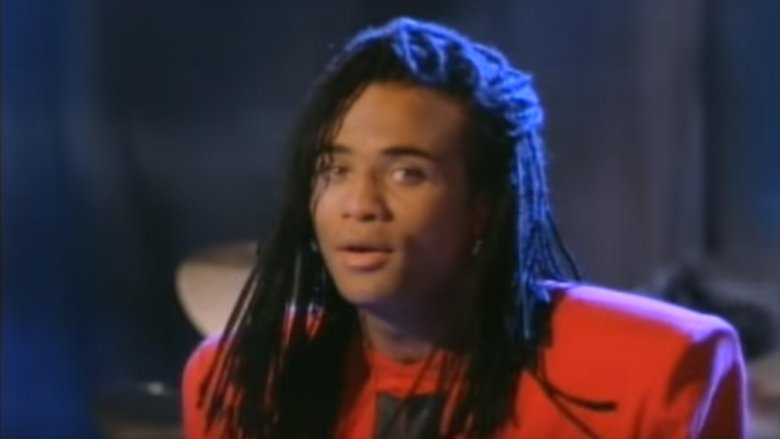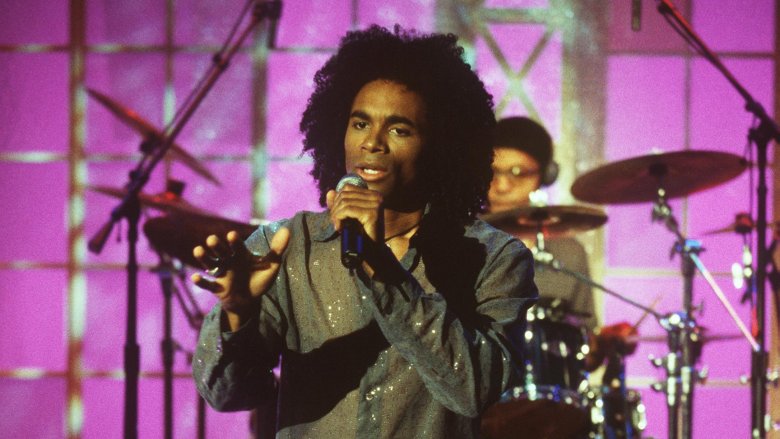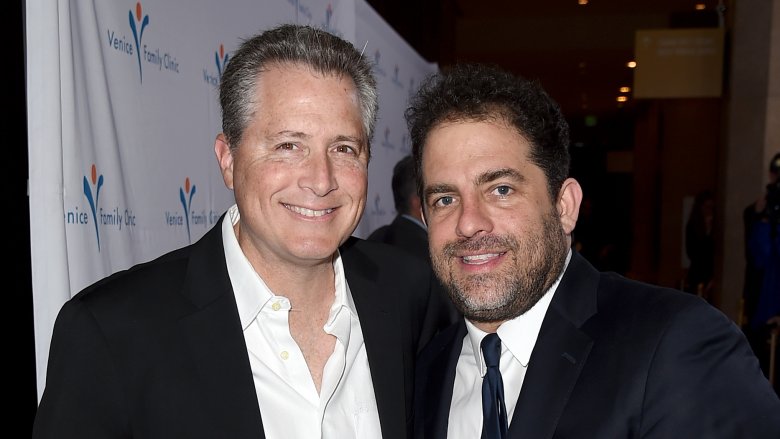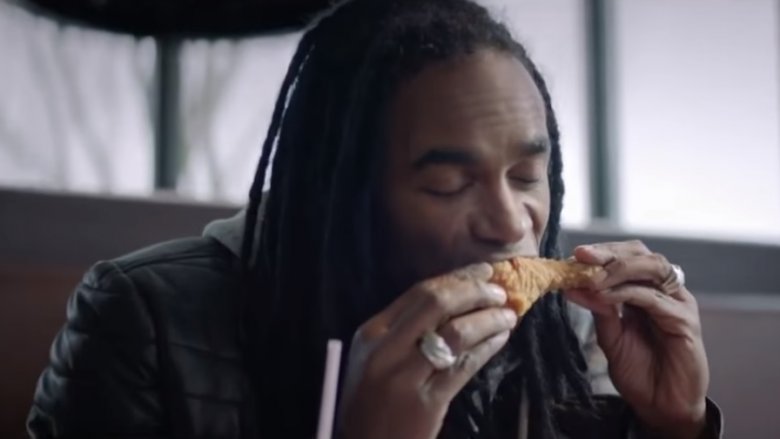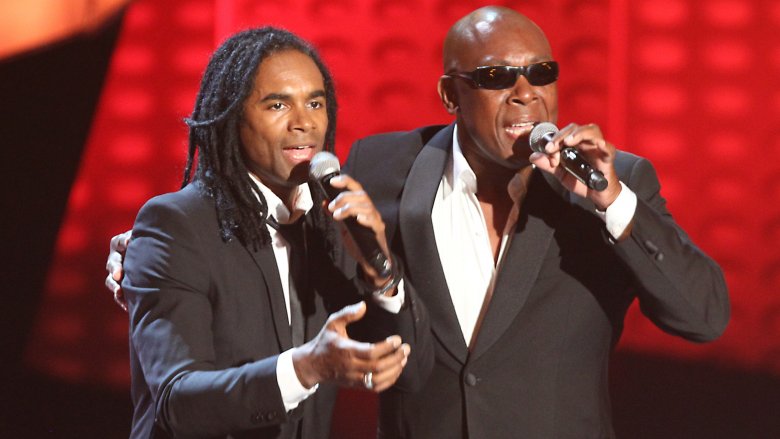Whatever Happened To Milli Vanilli?
Artifice has been firmly embedded in the Milli Vanilli story from the very beginning; look no further than the group's early claims that "Milli Vanilli" meant "positive energy" in Turkish. That was what they delivered, sure, and when you and your best friend were driving around in the middle of summer with the sunroof open and the radio blaring, or some other electric-blue-neon-soaked dream scenario from the late '80s, "positive energy" was just enough. In reality, though, the band was named after a defunct disco in Berlin. Strategically muddying the waters had always been Milli Vanilli's thing, even if the musicians themselves weren't the ones steering the ship.
If you weren't around in 1989 or if catching reruns of VH1's Behind the Music isn't a regular pastime of yours, here's the short version: A pair of foreign heartthrobs became a pop sensation in the U.S. in the '80s after the success of "Girl You Know It's True," their USA debut album, culminating in a Best New Artist Grammy win in 1990. But girl, it wasn't true, and by the following year everyone knew it. They hadn't sung a note themselves, and they were ousted from the biz about as quickly as they'd been welcomed in.
It could have been a minor footnote in pop history, a warning for future artists, but the story of Milli Vanilli after the fall is a surprisingly eventful one. Let's strip away the backing track and have a proper listen, eh?
The Milli Vanilli scandal and the immediate aftermath
Anyone who'd seen Milli Vanilli perform live probably suspected something was up, but it was a disastrous MTV performance in early 1989 that sealed it. The guys were lip-syncing their hearts out to "Girl You Know It's True," bless 'em, when the backing track started skipping and repeating "girl you know it's girl you know it's" over and over again, like some kind of purgatorial pop-cheese nightmare. The seeds of doubt were definitively sown, watered, and in full bloom.
Scrutiny mounted, pitchforks were polished, and on November 14, Rob, Fab, and manager Frank Farian conceded it had all been a ruse, according to the New York Times. They were stripped of their Grammy a few days later. Rob and Fab wanted to give the award to the real singers, and claimed they'd been duped by Farian. Poor, hungry, and eager to prove themselves when the producer first encountered them in Berlin, apparently he promised them they could use their own voices on future albums and tours if they kept those lips syncing dutifully for a while. They went along with it, but he went back on his word. They also said their record label, Arista, knew about it the whole time, a claim Arista vehemently denied.
As far as most were concerned, Milli Vanilli was done. But for anyone who was still listening, a surprisingly complex and engaging story of two naive but sympathetic wannabe stars and the mildly Machiavellian producer pulling their strings was just starting to emerge.
Will the real Milli Vanilli please stand up?
The Milli Vanilli saga isn't really a tale of heroes and villains in the traditional sense, but if there's a villain to be found here at all, it's probably Frank Farian. By late 1990, the corpse of Milli Vanilli's career had barely cooled off, but Farian was already propping it up on stage and slapping a bit of fresh makeup on it for his next venture.
Farian — who still maintained he'd done nothing wrong — reformed the group with some of the real singers from before, namely Brad Howell and John Davis. He named them "The Real Milli Vanilli," and there was even one guy in the group dressed and made up to look suspiciously like Rob. They released one album overseas, called The Moment of Truth, which is about as subtle as your average Milli Vanilli song. The album was also marketed in the U.S. with some extra tracks, a few members were shuffled around (someone who looked an awful lot like Fab was brought on board this time) and the band's name was changed to the painfully '90s but undeniably rad Try 'N' B.
Whether the wounds of betrayal were still too fresh, the music just wasn't good enough, or the cash-cowing was too blatant, the public didn't respond and neither iteration lasted beyond that one album.
Customer dissatisfaction with Milli Vanilli
If refunds for underwhelming live shows were more commonplace, Bob Dylan would probably have to take on a few night shifts at a tollbooth somewhere for the extra cash. In the case of Milli Vanilli though, underwhelming wasn't the word — people felt betrayed. The two dudes chest-bumping and high-kicking in the music videos weren't the same dudes singing on the record, and many of the fans weren't going to just take that lying down. It was worthy of punishment, they felt, and the courts were inclined to agree.
At least 26 lawsuits were filed claiming the record company defrauded Milli Vanilli fans, and a Cook County judge approved a settlement that allowed thousands of them to get partial refunds. Under the settlement, those who bought Milli Vanilli CDs were entitled to $3 refunds, those who bought cassettes could claim $2, and those who could prove they attended a Milli Vanilli concert were entitled to 5 percent of the ticket price. Arista also agreed to donate a sizable sum to various charities.
A toll-free number was even set up to answer questions about the refunds, so spare a thought for the poor sucker in charge of fielding calls from the indignant parents of inconsolably heartbroken tweens. Even the judge saw the silly side in the grand scheme of things, saying he hoped to just get this case out of the way so that everyone could "devote their time to the resolution of controversies of a more significant social and economic nature."
Milli Vanilli's awkward showbiz years
The name "Milli Vanilli" had become shorthand for a certain kind of fraudulence in pop culture and beyond, and that's something that persists today. Drake has been called the Milli Vanilli of hip-hop, Steve Kerr the Milli Vanilli of basketball coaching. The name was toxic. If you were the Milli Vanilli of anything, you might as well have had "PHONY" branded on your forehead. Still, Rob and Fab were committed to each other, committed to the brand, and they weren't ready to give up the spotlight. They'd already gotten used to the matching braids, after all.
Their initial approach was a smart one. They opted for self-parody, starring as themselves in a sugarless gum commercial in which they lip-synced to an opera song until the tape started to skip, hardy har har. After that, according to the LA Times, they signed a deal with the firm that represented Arnold Schwarzenegger in the hopes of making it in film and TV. Remember, this was an era when people like Hulk Hogan and Vanilla Ice had managed to cultivate a dependable side-hustle playing themselves in movies, so it wasn't inconceivable. But maybe a career in acting — or more specifically, presenting themselves as something they weren't on camera — hit a little too close to home in the eyes of the industry gatekeepers, given the duo's recent history. Whatever the reason, they didn't get very far.
Milli Vanilli ... keeping it real?
On their eventual return to the recording studio, the guys did things their way. They ditched the Milli Vanilli moniker, they kept Frank Farian as far away from them as possible, and crucially, they were using their own voices. The result was 1993's self-titled album Rob & Fab.
It wasn't the first time people would be hearing the artists formerly known as Milli Vanilli sing. During their mid-scandal press conference back in 1989, they humored the reporters in attendance by knocking out a few bars of "Girl You Know It's True" with some competence. They also performed a new single together on stage in 1992 and sounded at least as good as the people who sang on their record, according to those in attendance (via the LA Times). But it was the first time they'd be laying their voices down on wax for anything, let alone a full-length LP. Surely there was some interest for the novelty of it all, if nothing else?
Apparently not. Nobody cared anymore. The album sold only 2,000 copies in the U.S. and was basically forgotten without a trace. As they trudged back to the drawing board, a mass of churning, buried turmoil started to bubble to the surface and take its toll on the duo's relationship, ultimately thrusting one of them ever deeper into the pit of despair their messy spell of fame had opened up.
The higher they climb...
Rob was always the chattier and more dynamic one of the Milli Vanilli duo. He was the one speaking up in press conferences and interviews, he was the one dishing the dirt on Frank Farian. Fab just nodded along and occasionally voiced his agreement for the most part. In a way, the Munich native acted as the voice of a naive but well-meaning pop duo that'd been rendered voiceless by the industry. And when the floor fell out from under them, he was the one who fell hardest.
In a 2018 interview with the BBC, Fab recalls that Milli Vanilli both plunged head-first into a thick fog of narcotics in an effort to cope with things after the scandal broke. And while Fab's relationship with drugs remained relatively functional, Rob's was anything but, and his struggle eventually got the better of him. He had to be talked down from a ninth-story balcony by police in 1991, according to Entertainment Weekly, and following the release of Rob & Fab he was in and out of rehab and served time in jail. Fab got sober, and the relationship between the two disintegrated to the point that they didn't really have one by 1997. Rob's tragic descent never did let up; he died of an accidental overdose the following year at the age of 33.
The comeback kid
Suddenly a Milli without a Vanilli (or is it the other way around?), the viability of Fab's music career after Rob's death was anyone's guess. Even after their secret came out he'd always seemed more comfortable quietly stepping back while Rob sounded off. But instead of leaving music behind and drifting off numbly into relative obscurity, he kept trucking on with a renewed creative verve, as if it'd been blessed and infused with that of his fallen friend and bandmate.
After Rob's death, according to People, Fab stayed busy as a public speaker, a session musician, and a radio DJ. Driven by that ever-present drive to prove himself and everyone else wrong, he buried himself in his music, learning how to play an instrument, how to write, and how to produce. If anyone was going to call him inauthentic, he made sure they'd have a hard time justifying it. His first solo album, 2003's Love Revolution, heralded his comeback proper, and included a genuinely heartfelt acoustic tribute to Rob called "It's Your Life."
He was back on the map and continued to release music sporadically over the next decade or so. It was a far cry from the stratospheric heights of Milli Vanilli's success and fandom, but it didn't matter. Fab had finally found his voice.
There's a Milli Vanilli biopic on the way. Maybe.
Once all the major events of the Milli Vanilli story are laid out and thoroughly examined, it becomes clear that this is a tale destined to be told on a bigger stage. It might not be a Greek tragedy, but if a movie can be made about emojis, a movie can be made about Milli Vanilli. The silver screen treatment has eluded them thus far, but not for lack of effort.
There's been a script for the Milli Vanilli biopic knocking around since 2007, as reported by Variety, written by Catch Me If You Can scribe Jeff Nathanson. A handful of potential studios and directors have been attached at one point of another since then, most recently Brett Ratner. Ratner had go-to-Hollywood-villain-guy-of-the-moment Christoph Waltz in mind to play Frank Farian, and identical twins and dancing superstars Laurent and Larry Nicolas Bourgeois lined up as the central duo. But after sexual harassment allegations were leveled against Ratner in late 2017, the project fell right back into production limbo. Fab remains hopeful that it'll happen eventually, though, firmly grasping the reigns of his own legacy for the first time and confidently telling Variety, "We made history once, we're ready to do it again."
A Kentucky-fried return to television for Milli Vanilli
It took a while, but the surviving half of Milli Vanilli eventually found his way back to televised advertising, starring in a documentary-style commercial as part of KFC's "Being Real" campaign in 2016. The "style" there is important because despite the natural verité approach there's really nothing genuine about this, and Fab's acting was better back in the '90s. Still, the message is a noble one and hey, guy's gotta eat.
Looking like he'd aged maybe a total of two weeks since 1989, Milli Vanilli's Fab spends three minutes and change waxing philosophically about his past, his present, and the concept of realness, all while working on his music and eating chicken. This is a significant moment in Fab's journey, not only because it heralded a self-reflexive return to a medium he'd flirted with in the past, but because suddenly Fab's newfound realness and authenticity had almost become a marketable commodity in and of itself. There's probably some twisted irony in there somewhere.
Embracing Milli Vanilli's past to forge the future
Not content to just scorch the Earth of the memory of Milli Vanilli, Fab has instead decided to embrace and celebrate it of late. The most recent phase of his musical comeback has seen him tapping back into that well, the passage of time having drained it of poison. He even brought a familiar voice along for the ride, joining forces with one of the original Milli Vanilli vocalists, John Davis, in 2015. They performed together at Berlin's Silvester 2015 party to an enthusiastic crowd, and planned to release a full album called Face Meets Voice: A True Milli Vanilli Experience. That album has yet to see the light of day, but it does seem like there might actually be an audience for it.
Fab still plays solo shows, and even there he breathes new life into those jilted Milli Vanilli classics. It's a way to keep Rob with him, according to his 2018 BBC interview, and to free those memories and the Milli Vanilli association from a place of shame and negativity into one of love and joy. And come on, you have to admit, those tunes are still just as infuriatingly catchy as they were back in the day.
